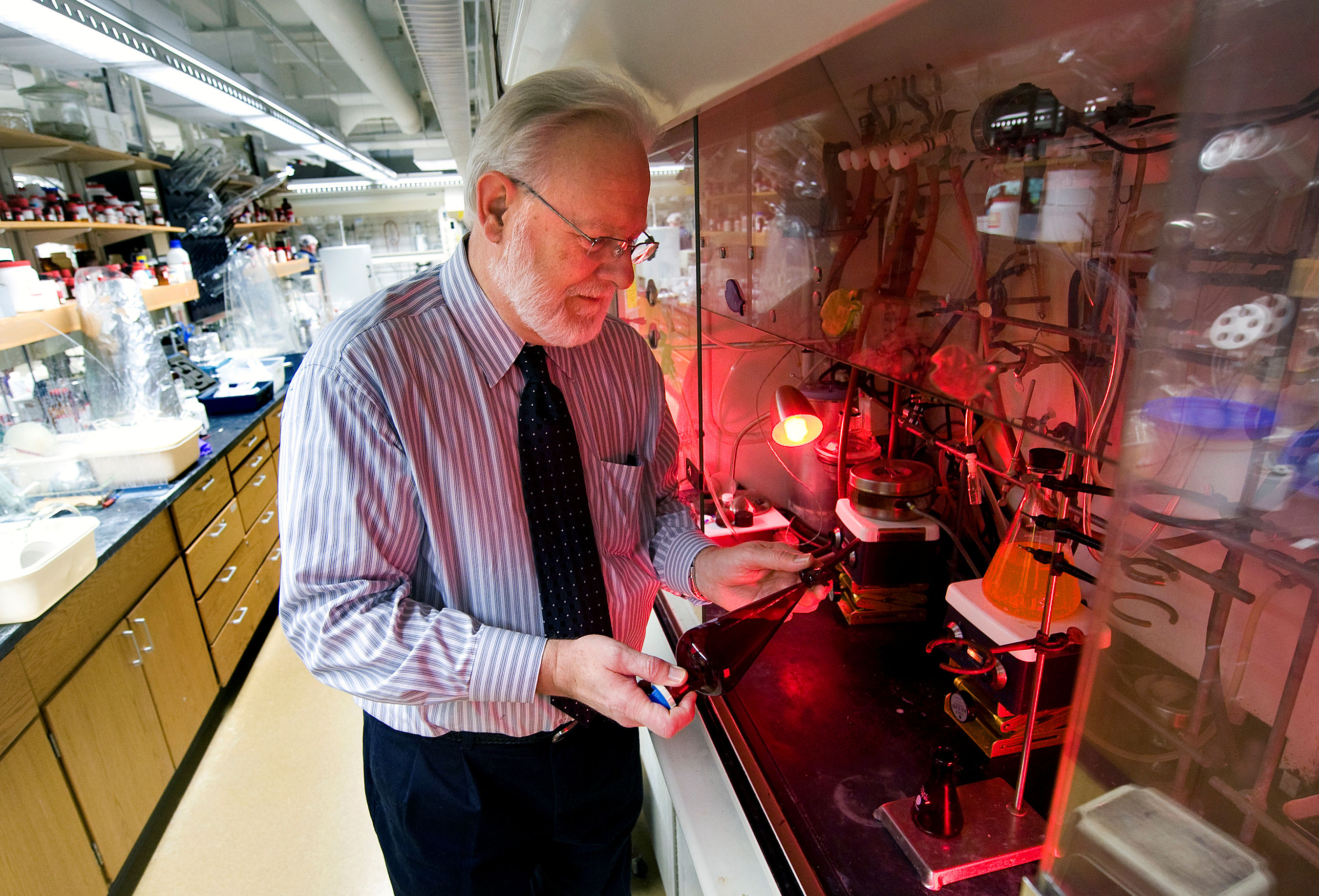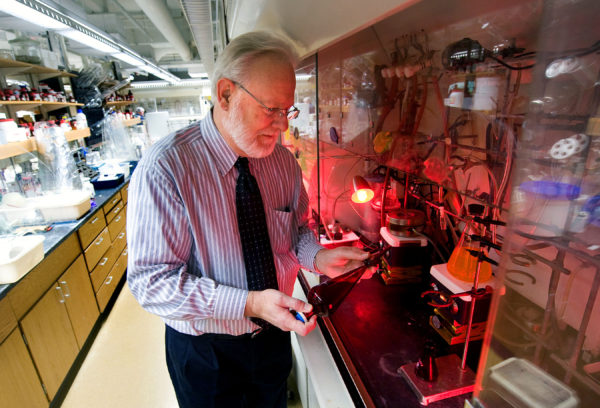
02 Aug Telluride Mushroom Fest: Dr. David Nichols, Renaissance in Psychedelic Research
Since 1981, the Telluride Mushroom Festival has celebrated all things mycological, from the newest advancements in mushroom science to its famous mushroom cook-off. The 39th annual Telluride Mushroom Festival takes place Wednesday, August 14 – Sunday, August 18.
Full SCHED online schedule.
NEW THIS YEAR: One hour before each event is scheduled to begin, Q cards will be handed out to pass holders until all Qs are gone (ie. event spots have been spoken for). Fifteen minutes before the event is scheduled to begin, Queue card holders with line up in order and be admitted into the venue ten minutes before the event is scheduled to start.
Please scroll down to listen to a podcast with Dr. David Nichols, a pioneer is psilocybin research and Thursday night’s keynote.

Dr, David Nichols (with sep funnel). Courtesy photo.
The Heffter Institute believes psychedelics have great, unexplored potential that requires independently funded scientific research to find their best uses in medical treatment. To that end, its mission is to promote research of the highest scientific quality with the classic hallucinogens and related compounds, sometimes called psychedelics, in order to contribute to a greater understanding of the human mind. The goal: improve the human condition and alleviate suffering.
The founder of the Heffter Research Institute is Dr. David Nichols, who incorporated the nonprofit in Mexico in 1993. He returns to the Telluride Mushroom Festival to deliver the keynote address on Thursday, August 15: “From Bench to Bedside, Progress in Psychedelic Research.” He speaks again on a panel that includes Guiliana Furci, Peter Hendricks, Sara Lappan and Teresa Egbent. The subject is “Psychedelics: Current and Future Science, Chemistry, and Legal Status.”
“This talk will give an overview of psychedelic natural products; where they come from, what they are. Some attention will be given to psilocybin, with possible explanations for its oral activity when other simple tryptamines are not orally active. Discussion will proceed to problems encountered when doing research on psychedelics; how are they modeled in the laboratory. Recent work in understanding how LSD works with some comments on its receptor mechanism will follow. Finally, a brief explanation will be provided on what we know about how psychedelics can provide clinical relief for depression, anxiety, and certain addictions,” explains Mushroom Fest about Dr. Nichols’ opener.
Psychedelics then and now:
Dating back to the ancient Greeks, Psychedelics have been used throughout history primarily for their healing properties, rather than for purely hedonistic ends. Indigenous cultures in pre-conquest South and Central America used psychedelic plants throughout the ages, always treating them with great respect and reverence and seeing them as powerful medicines for the mind, body, and soul.
Fast forward to the modern West. When substances like LSD (acid) and MDMA (ecstasy) were first discovered, their initial applications were in the realm of psychotherapy and treatment for mental disorders like addiction. Psychiatrist Dr; Humphry Osmond, who coined the term “psychedelic,” used LSD and mescaline in the 1950s to treat alcoholism and study schizophrenia; other researchers like Dr. Stanislav Grof explored the clinical applications LSD could provide in psychology and psychotherapy.
Enter the era of drugs, sex and rock ’n roll. During the so-called “cultural revolution” of the ‘60s, young people took LSD on a very large scale, triggering a backlash in the form of laws that strictly forbade further research into the benefits of psychedelic substances.
“Psychedelics had been demonized and trivialized in the mainstream media and science had ignored them; there was virtually no research funding to study them, and the overwhelming consensus seemed to be that psychedelic agents had absolutely no redeeming value. They were just seen as useless drugs of abuse. I, however, did not subscribe to that belief. I was very fortunate to be able to secure grant support for my work through most of my career at Purdue. That proved important to keep the field alive and to give it a chance to flourish,” explained Nichols.
The strictures on research lasted two decades until finally in the early 1990s approval for further research was granted once again.
“In 1992, the FDA decided that properly designed studies, with appropriate approvals, could again be initiated. My Purdue expertise then proved critical. Even if a researcher could obtain approval to carry out a human study with a psychedelic, there was no company willing to manufacture those substances with a suitable purity, and at an affordable cost. Early on, I was approached by an organization called MAPS inquiring whether my laboratory had the willingness and the capability to prepare a drug known as MDMA (Ecstasy) for toxicology testing and eventual human trials. Along with my students we were able to prepare 2 kilograms (more than four pounds) of very high purity MDMA. That material was subsequently used in human clinical trials, and recently the Food and Drug Administration (FDA) gave breakthrough therapy designation to the use of MDMA for the treatment of post-traumatic stress disorder (PTSD). …,” continued Nichols.
Today, thanks in large part to the ongoing efforts of Dr. Nichols and his colleagues, scores of new studies into the therapeutic benefits of psychedelics are appearing every year from lauded institutions such as Johns Hopkins University, University of New Mexico, UCLA, NYU, and Stanford, with the results being published in respected peer-reviewed publications.
In an Op Ed piece published in May 2019 in The New York Times, Michael Pollan, author, “How to Change Your Mind, said this on the subject:
“Scientists at places such as Johns Hopkins, New York University, Harbor-U.C.L.A. Medical Center and Imperial College in London have conducted small but rigorous studies that suggest a single psilocybin trip guided by trained professionals has the potential to relieve “existential distress” in cancer patients; break addictions to cigarettes, alcohol and cocaine; and bring relief to people struggling with depression. Psychiatry’s current drugs for treating these disorders are limited in their effectiveness, often addictive, address only symptoms and come with serious side effects, so the prospect of psychedelic medicine is raising hopes of a badly needed revolution in mental health care.
“This might help explain why the Food and Drug Administration granted ‘breakthrough therapy’ status last year to psilocybin, which promises to speed its consideration as a treatment for depression. But the research also shows that psilocybin may have value for the rest of us: Studies have demonstrated that, properly administered, a psilocybin journey can have enduring, positive effects on the well-being and relative openness of “healthy normals,” as researchers put it.
“This is all very exciting, especially coming at a time when rates of depression, suicide and addiction are rising. But the history of psychedelics has been marked by periods of both irrational exuberance and equally irrational stigmatization, so a few cautionary notes are in order…”
Nichols sums up on an optimistic note:
“I now believe we are witnessing the beginning of a paradigm shift in the practice of psychiatric medicine that will allow effective treatment for millions of individuals suffering from depression, addictions, and several other disorders who are currently not well-treated. I could not be more pleased to see my dream finally bloom into reality.”
Dr. David Nichols, more:
David E. Nichols, PhD., is currently an Adjunct Professor of Chemical Biology and Medicinal Chemistry at the University of North Carolina, Chapel Hill, Eshelman School of Pharmacy. Previously, he held the Robert C. and Charlotte P. Anderson Distinguished Chair in Pharmacology and, in addition, was a Distinguished Professor of Medicinal Chemistry and Molecular Pharmacology at the Purdue University College of Pharmacy, where he taught both professional undergraduate, as well as graduate classes.
Nichols also was an Adjunct Professor of Pharmacology and Toxicology at the Indiana University School of Medicine and taught in the medical curriculum.
He received his B.S. degree in chemistry from the University of Cincinnati in 1969, and a PhD in Medicinal Chemistry from the University of Iowa in 1973, after which he did postdoctoral work in pharmacology at the University of Iowa, College of Medicine.
Nichols joined Purdue University in 1974, where he remained until his retirement in June 2012.
He was continuously funded by the NIH for nearly three decades and served on numerous government review panels. Dr, Nichols’ two principal research areas focused on drugs that affect serotonin and dopamine transmission in the CNS.
In 2004 he was named the Irwin H. Page Lecturer by the International Society for Serotonin Research; in 2006, he received the first Provost’s Outstanding Graduate Mentor award from Purdue University.
Nichols has published more than 300 scientific articles, book chapters, and monographs, most of which deal with the relationship between molecular structure and biological action. He has been awarded nine composition of matter patents.
In 1993 Dr. David Nichols founded the Heffter Research Institute, which has supported and funded clinical research with psilocybin and led the so-called “renaissance in psychedelic research.”


Sorry, the comment form is closed at this time.